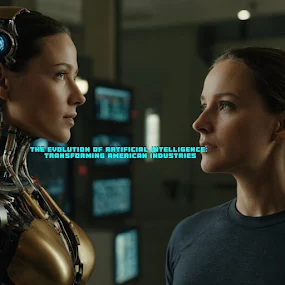Transforming American Industries
The Evolution of Artificial Intelligence: Transforming American Industries
Artificial Intelligence (AI) has transitioned from a futuristic concept to a present-day reality reshaping industries globally. In the United States, AI is influencing healthcare, finance, education, and even agriculture, paving the way for a technological revolution. This article explores the evolution of AI and its profound impact on American industries.
1. A Brief History of Artificial Intelligence
AI’s journey began in the 1950s with simple algorithms designed to mimic human thought processes. By the 21st century, advancements in machine learning and neural networks revolutionized the field.
Key Milestones:
- 1956: Dartmouth Workshop marks AI’s official beginning.
- 1997: IBM’s Deep Blue defeats chess champion Garry Kasparov.
- 2011: Siri becomes the first popular AI assistant on smartphones.
- 2020s: Generative AI tools like ChatGPT redefine content creation.
2. AI in Healthcare: Revolutionizing Patient Care
The healthcare industry has embraced AI for diagnostics, treatment plans, and patient monitoring.
- Predictive Analytics: AI algorithms analyze patient data to predict diseases like cancer and diabetes.
- Telemedicine: Virtual assistants powered by AI enhance patient-doctor interactions remotely.
- Drug Development: Companies like Moderna are using AI to accelerate vaccine research.
3. AI in Finance: Enhancing Efficiency and Security
From fraud detection to personalized banking experiences, AI is transforming the financial sector.
- Fraud Detection: AI systems identify unusual patterns in transactions, preventing financial fraud.
- Automated Trading: Robo-advisors manage investments based on real-time data.
- Customer Support: AI chatbots improve customer engagement and reduce response times.
4. Challenges in AI Adoption
While AI presents immense opportunities, it comes with challenges:
- Ethical Concerns: Ensuring unbiased algorithms and preventing misuse.
- Privacy Issues: Protecting sensitive user data from breaches.
- Workforce Displacement: Preparing the workforce for AI-driven automation.
Conclusion
AI’s impact on American industries is undeniable, offering both opportunities and challenges. As innovation continues, the focus must be on ethical, secure, and inclusive AI development to ensure a balanced future.




.jpg)


